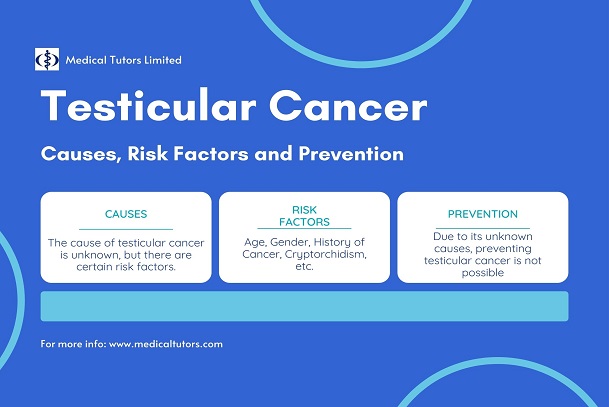 Wash your hands regularly and wear a face mask.
Learn more
Wash your hands regularly and wear a face mask.
Learn more

What Causes Testicular Cancer?
Questions about what really cause testicular cancer has been asked severally yet unanswered. Most testicular cancers have been known to start from the germ cells, yet medical scientists and doctors haven’t been able to determine what causes the testicular cells to become cancerous.
Although, the exact cause of testicular cancer is relatively unknown, there are certain factors that may increase a person’s risk of having testicular cancer. These factors are referred to as risk factors.
Testicular Cancer Risk Factors
Risk factors are things that change a person’s chance of getting certain diseases especially cancer. Various cancers have quite a few risk factors; some can be changed e.g., diet, smoking while some can’t be changed e.g., age and family history.
When certain risk factors are identified in an individual, it does not mean he will get the cancer; same way not having the risk factors does not mean a person can’t have cancer. That is why if a person with testicular cancer has various risk factors, it is very difficult to determine the contribution of those risk factors to the cancer.
For testicular cancer, certain risk factors have been identified, and they include the following which can be viewed as either unchangeable (general risk factors and genetics) and unchangeable factors (other conditions).
General Risk Factors (Unchangeable)
The general risk factors are usually unchangeable due to conditions that the person with testicular cancer cannot be changed.
Genetics (Unchangeable)
Other Conditions (Changeable)
Prevention of Testicular Cancer
Preventing testicular cancer is currently not possible due to its unknown reversible causes. Moreover, many men who have been diagnosed with testicular cancer have no known risk factors, and those with known risk factors, such as undescended testicles, age, family history, cannot be changed. However, with early detection one can prevent further advancement or spread of testicular cancer cells, by prompt treatment.
[Next Article: Diagnosis of Testicular Cancer]
References: American Cancer Society; WHO; WebMD, Cancer.net
© Medical Tutors Limited